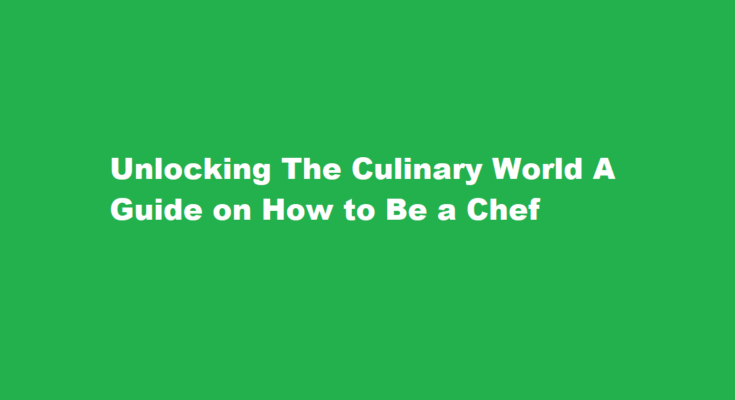Introduction
The world of culinary arts is a tantalizing realm where creativity meets craftsmanship, and flavors dance on the palate. Becoming a chef is not just a career choice; it’s a passion-driven journey filled with culinary adventures. Whether you aspire to be the next Michelin-starred chef or simply want to impress your friends and family with delectable dishes, this guide will provide you with a roadmap to follow your culinary dreams. Let’s embark on this flavorful journey together.
Develop Your Culinary Curiosity
The first step towards becoming a chef is to nurture your culinary curiosity. Begin by exploring different cuisines, ingredients, and cooking techniques. Watch cooking shows, read cookbooks, and visit local markets to discover the diverse array of ingredients available. This curiosity will serve as the foundation of your culinary knowledge.
Enroll in Culinary School
Formal culinary education is invaluable for aspiring chefs. Enrolling in a culinary school will provide you with structured training, hands-on experience, and exposure to a wide range of culinary disciplines. Look for reputable schools that offer comprehensive programs, and be prepared to invest your time and effort into honing your skills.
Master the Basics
Every chef starts by mastering the basics. Learn essential cooking techniques such as knife skills, sautéing, roasting, and blanching. Practice these skills until they become second nature. Remember, a strong foundation is crucial for culinary success.
Gain Practical Experience
Practice makes perfect in the culinary world. Seek internships or entry-level positions in restaurants, catering companies, or hotels. Practical experience will expose you to the fast-paced, high-pressure environment of a professional kitchen and help you refine your skills.
Build Your Culinary Repertoire
Expand your culinary repertoire by experimenting with different cuisines and dishes. Don’t be afraid to make mistakes; they are valuable learning experiences. Taste your creations critically and constantly strive to improve. Over time, you’ll develop your unique style and flavor profiles.
Learn from Experienced Chefs
Mentorship is a key ingredient in a chef’s journey. Seek guidance and advice from experienced chefs who can provide insights, share their knowledge, and help you navigate the challenges of the culinary world. Learning from their experiences can be invaluable.
Develop Your Palate
A refined palate is a chef’s most valuable tool. Train your taste buds by tasting a wide range of ingredients and dishes. Pay attention to flavors, textures, and aromas. Practice blind taste tests to enhance your ability to identify ingredients and seasonings.
Hone Your Organizational Skills
In a bustling kitchen, organization is paramount. Learn to manage your time efficiently, plan menus, and coordinate kitchen operations. Effective organizational skills will help you stay calm under pressure and produce consistent, high-quality dishes.
Embrace Creativity
Cooking is an art, and chefs are artists. Embrace your creativity and don’t be afraid to think outside the box. Experiment with unconventional ingredients, fusion cuisines, and innovative cooking techniques. Creativity is what sets extraordinary chefs apart from the rest.
Stay Informed and Evolve
The culinary world is constantly evolving. Stay informed about the latest food trends, dietary preferences, and sustainable practices. Attend workshops, seminars, and food festivals to keep your skills up to date and remain relevant in the industry.
Build a Strong Work Ethic
Success in the culinary field requires dedication and hard work. Be prepared for long hours, physically demanding tasks, and the challenges of a fast-paced kitchen. A strong work ethic is essential for making your mark as a chef.
Showcase Your Skills
As you gain confidence and experience, consider showcasing your skills through social media, food blogs, or pop-up events. Building an online presence can help you connect with a wider audience and attract potential clients or employers.
Frequently Asked Questions
What knowledge will I need to be a chef?
You have to master culinary techniques, as well as the percentages of exact ingredients, the appropriate temperatures, preparation times and the safety and hygiene steps needed at all times. All this implies great responsibility on your part, as is required when handling the food your customers will be enjoying.
What are 5 things a chef does?
Chefs can oversee kitchen workers, order food supplies, estimate food requirements, and maintain quality assurance on various dishes. Chefs have the following additional duties: Creating recipes and preparing meals.
Conclusion
Becoming a chef is a rewarding journey that requires passion, dedication, and continuous learning. By nurturing your culinary curiosity, enrolling in culinary school, mastering the basics, gaining practical experience, and seeking mentorship, you can lay a strong foundation for your culinary career. Embrace creativity, refine your palate, and never stop evolving. With hard work and determination, you can turn your culinary dreams into a delicious reality and share your love for food with the world. Bon appétit!
Read Also : Boosting Testosterone Naturally Strategies for Optimal Health



